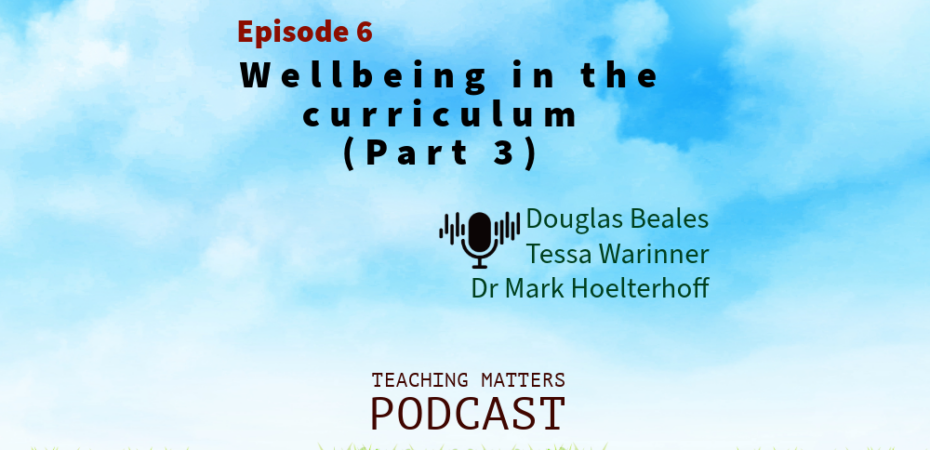
In the final part of this three-part podcast, Wellbeing Advisors Douglas and Tessa talk to Dr Mark Hoelterhoff the four transformations mentioned in the Wellbeing in the Curriculum report, incorporating diverse experiences and what the next few years look like for the wellbeing in the curriculum project. This episode belongs to Podcast series: Student Wellbeing↗️.
Mark discusses how the four transformations outlined in the report have been manifested in the Edinburgh Lead well programme. He notes that since the published report there is a new emphasis on “compassion” and that
“One of the outcomes that we say that we want to achieve in that integration at the foundation level of having wellbeing as a universal embedded experience across all subject areas is that, one, there’s an interest. So, ‘I want to go further and explore this further’, but also that we raise what we refer to as mental health literacy. Which is ‘OK, like we have an understanding of what these things mean’ and that allows us to be compassionate not just to ourselves, but to the people that we work with.”
Douglas then asks Mark about the importance of including diverse perspectives and different cultures. Mark talks about how understandings of what we mean by wellbeing between different cultures can be quite stark. He notes how it’s important to listen to these diverse perspectives and have them inform the project from the start.
“It’s really a bottom up, a grassroots kind of approach to having conversations and so that culturally people from different backgrounds who understand it a different way, they can kind of get what we’re talking about, like about thriving and flourishing, and we can share that vision. But how that is achieved is going to look different for different students.”
Douglas asks Mark what he would say to students who are uncomfortable with the idea of speaking about wellbeing in an academic setting. Mark talks about how we need be careful not to impose anything onto students that they would feel uncomfortable with, for example, when education might be a great escape for them. However, he notes that part of the university’s aim is to create leaders that have wellbeing at the forefront of their decisions.
“…The reason we’re calling it the Edinburgh Lead Well program is that as a university we are trying to hopefully graduate leaders. People who are going to make an impact in their fields and their families and their society and their communities, whatever. But that they are leading, they’re working, they’re practicing from a place of wellbeing. So I think the trick with that is that people sometimes think of wellbeing as this personal private thing, which it is, but it is also how we practice as people in our fields also as a leader, as a manager.”
Tessa concludes the podcast by asking what the plan is for the next couple of years. Mark talks about some of the challenges they’ve been facing with the implementation and thew exciting take up of early adopters.
Timestamps:
(00:44) Douglas and Mark discuss the four transformations outlined in the Wellbeing in the Curriculum project for a couple of years ago.
(03:54) Douglas and Mark discuss the importance of incorporating “diverse perspectives” into wellbeing initiatives at universities.
(08: 29) Douglas further asks Mark what he would say to students who are uncomfortable with speaking about wellbeing in an academic setting.
(12:53) Tessa asks Mark about what the plan is for the next couple of years.
Douglas Beales and Tessa Warinner are Student Wellbeing Advisers at the Student Wellbeing service, The University of Edinburgh. Dr Mark Hoelterhoff is a lecturer in clinical psychology at The University of Edinburgh and recently has been working on the idea of well-being in the curriculum.
Episode produced by:
 Sylvia Joshua Western
Sylvia Joshua Western
Sylvia is currently doing her PhD in Clinical Education at The University of Edinburgh and has a Master’s degree in Clinical Education. Her PhD research explores test-wise behaviours in Objective Structured Clinical Examination (OSCE) context. Coming from a dental background, she enjoys learning about and researching clinical assessments. She works part-time as a PhD intern at Teaching Matters, the University’s largest blog and podcast platform through Employ.ed scheme at the Institute of Academic Development.
Twitter/X: @sylviawestern↗️


